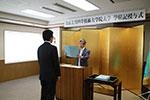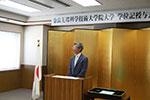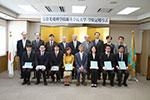2015/06/29
On Thursday, June 25, 2015, a graduation ceremony was held in the Administration Bureau Conference Room.
President Ogasawara presented degrees to each graduate and gave the congratulatory speech to the 7 graduates.
After the ceremony, the commemorative photograph was taken and the graduates enjoyed the graduation ceremony with the president, executive directors and their supervising professors.
*Number of Graduates in June
【Doctoral Graduates】
Information Science 4
Biological Sciences 3
Materials Science 1
Congratulatory Remarks to Graduating Students
Many congratulations to our eight students who have been conferred doctoral degree today! From this moment, you will embark on your new journey as independent, doctoral level researchers.
We now face a drastic change in the fields of science and technology. History witnessed the first revolution in the late 18th century with the invention of steam engines, followed by the second revolution in the early 20th century with intensive use of electricity, as well as the third revolution in the 1980s facilitated with computer-based automation. Right at this moment, we are experiencing the fourth industrial revolution that has been made possibly by IoT (Internet of Things)-based automation.
At a meeting to discuss the advancement of science and technology in Japan, the Ministry of Education, Culture, Sports, Science and Technology (MEXT) once mentioned:
At the forefront of today's research are breakthroughs in measurement, analysis, and computational technology that are rapidly expanding our understanding of natural and social phenomena. Consequently, scientific research itself is rapidly expanding and is in a constant state of flux, against the backdrop of: ongoing increases in the amount of information available on internet and drastic progress in computational science that are bringing about faster information processing speeds; and the development of transportation and telecommunications networks that make possible unprecedented speed in the dissemination and sharing of information. In broad domains such as life science and materials science, new interdisciplinary and multidisciplinary fields are being developed, and the frontiers of knowledge are being expanded rapidly.
Dramatic improvement of computer performance has led to the development of simulation technology, which overrides conventional ways of conducting experimental research to predict the unknown. Moreover, availability and accessibility of various "big data" (such as genome data, earth observation data, and human activity data) have created needs and opportunities for generating new knowledge.
In the field of life science, we are expected to understand not only how model organisms act in experimental conditions, but also how various organisms behave in natural environments. Such efforts would help us to conserve them.
Socially inclusive ICT (Information and Communication Technology) can open up new possibilities for social innovation when the technology is embraced by all people in societies with diverse sociopolitical backgrounds, not just by those in developed nations.
Science and technology will continue to progress no matter what... going far beyond our imagination we can possibly have today.
As a graduate of NAIST, I would like you to actively approach creating a new society and world by creating and practicing new science and technology.
So... let me ask you all. What can you do to contribute to such societal innovation? In this regard, I'd like you all to pay special attention to the following part of a report published by a committee of MEXT:
"In order for scientific research to serve as a 'source of national strength' in the current era of rapidly expanding frontiers of knowledge, it is of utmost importance for researchers to challenge themselves to cultivate new knowledge based on their own knowledge, creativity and research skills, and it is vital for researchers to keep in mind and clarify the significance of their own research subject (challenger spirit). To cultivate new knowledge, of course, it is necessary to place a high value on diversity and knowledge of traditional research fields. In addition, in the current era, you must maintain a broader, comprehensive view to avoid compartmentalized knowledge (well-roundedness). You are also faced with demands to produce new academic domains through cooperation and collaboration with researchers from various fields and a broad range of domestic and foreign counterparts (multi-disciplinarity). Furthermore, through discussion and verification within the global science community, you must strive to obtain global recognition of your research excellence by proposing new research frameworks, thus contributing beyond national borders (global perspective).
Thus, researchers are expected to seek new knowledge in a flexible manner, unlimited by traditional borders between research fields and institutions. As global citizens, you must work hard to both challenge and cooperate with those of different values and cultures, all the while adapting to changes in society and constantly endeavoring to produce novel research findings. In this way, the current era of scientific research strongly calls for "a challenger spirit", "well-roundedness", "multi-disciplinarity", and "a global perspective", so to speak.
I hope all of you will become an advocate for the creation and implementation of innovative science and technology.
During your years at NAIST, you have not only gained academic expertise but also developed the ability to identify problems, explore and implement solutions to these problems, evaluate the outcomes, and write academic papers on the outcomes through discussions with people having various viewpoints. I am confident that such experiences at NAIST will help you all lead creative lives.
In concluding my message, I would like to congratulate you all again. We look forward to your future success, and we will continue to support your future endeavors.
Naotake Ogasawara,
President
Nara Institute of Science and Technology
June 25, 2015







